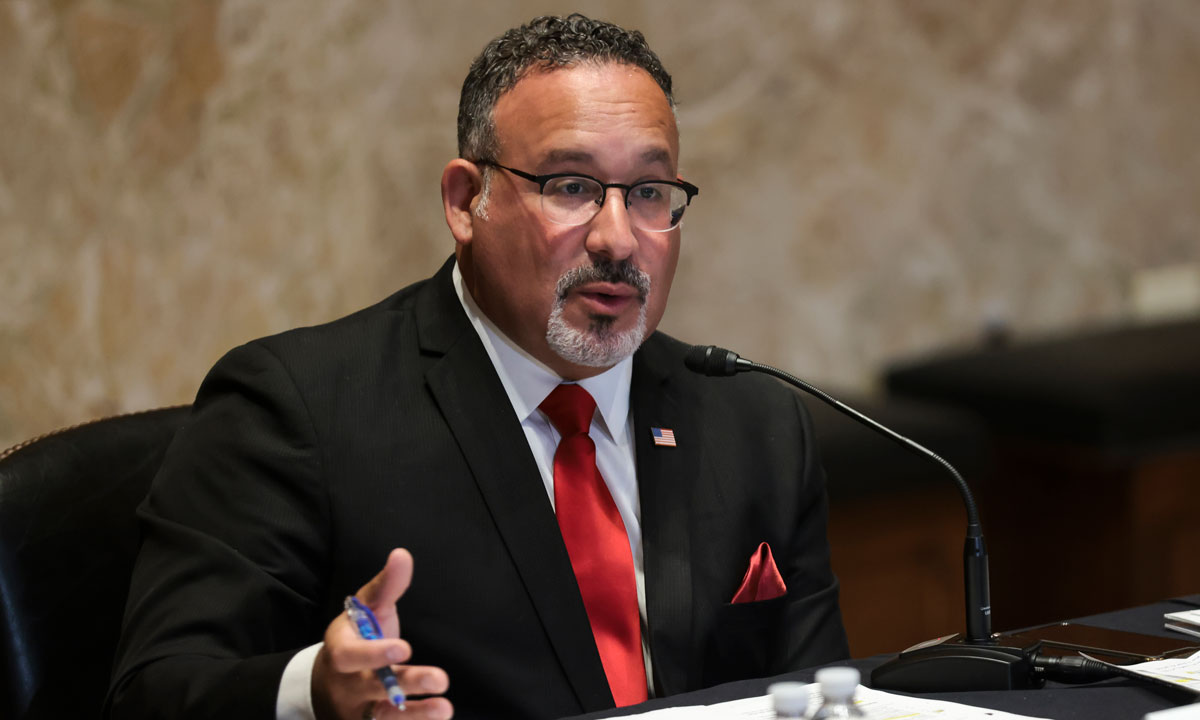Cardona Calls for Better Teacher Pay, More Multilingualism in Speech
In an address in Washington, the education secretary laid out his department’s 2023 priorities, but offered few specifics

Get stories like this delivered straight to your inbox. Sign up for The 74 Newsletter
Calling for increases to teacher salaries and greater strides toward multilingualism, but with scant mention of the task of post-COVID learning recovery, U.S. Secretary of Education Miguel Cardona outlined his department’s priorities for 2023 in a speech Tuesday afternoon.
Early on in the roughly 20-minute address at the department’s Washington headquarters — just blocks away from the newly Republican-controlled House of Representatives — the secretary pointedly eschewed the unveiling of new federal initiatives to improve K–12 performance, promising that the Biden administration would focus on “substance, not sensationalism.”
In its somewhat subdued tone, the text stood in noteworthy contrast to similar remarks delivered in the same spot a year earlier. At that time, buoyed by unified Democratic backing on Capitol Hill, Cardona stumped for massively expanded tutoring and mental health counseling to help students bounce back from the harms wrought by COVID school closures. This year, he made only a handful of references to the pandemic and no direct mention of generational learning loss.
The department’s aim, Cardona said, was to help harness “the collective will to act boldly and unapologetically to address student underperformance and the decades of underinvestment in education.”
That should include a boost to teacher pay, he said, observing that salaries for the profession lag those of comparably educated workers in many states; since the 1990s, inflation-adjusted weekly wages for college graduates have grown by about $445, while rising only about $29 for teachers.
Those meager rewards to education and service resulted in a teacher shortage last fall, Cardona argued, adding that the Biden administration had forgiven $24 billion of college debt to date for over 2 million public servants. But those benefits should be combined with greater engagement of educators in devising education policy, he said, along with opening up avenues to advancement within the profession through “master teacher” roles and increased teacher leadership opportunities.
In subsequent remarks to the press, Cardona expounded on the need to attract more teachers to the classroom with better pay and working conditions, invoking the worry of understaffed schools employing uncredentialed teachers. Even dedicated and well-funded tutoring programs, he said, “will not take the place of high-quality instruction.”
“Two, three years from now, we can’t have the same situation of our classrooms not having certified teachers,” Cardona said. “What chance do we have of evolving our high schools if we don’t have certified teachers in classrooms?”
That mission to “evolve” high schools refers to what was likely the address’s most concrete proposal: a forthcoming “Raise the Bar: Unlocking Career Success” initiative, designed in concert with First Lady Jill Biden as well as the secretaries of commerce and labor, to overhaul secondary education with an eye toward granting students the skills and credentials necessary to enter college or the workforce after 12th grade. Local colleges should seek to offer dual-enrollment coursework to high school juniors to help facilitate that knowledge acquisition, Cardona said.
The secretary further highlighted the department’s efforts to promote bilingual and dual-language education, promoting multilingual students as an unrealized asset for international competitiveness. Touting the federal education budget’s $760 million in Title III funding for assistance to English learners, he directly encouraged states and districts to work with Washington to step up their efforts in the space.
“Let’s look at our students in bilingual programs as gifted with assets that we want other students to have,” Cardona said. “Being bilingual and bicultural is a superpower.”
Get stories like these delivered straight to your inbox. Sign up for The 74 Newsletter

;)
